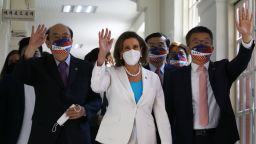Whether House Speaker Nancy Pelosi’s risky trip to Taiwan was a valuable statement of US resolve or provoked China for no strategic gain depends on when, or if, Beijing’s consequent fury and military posturing abate.
Pelosi visited legislators and President Tsai Ing-Wen on the democratic self-governing island on Wednesday, giving her hosts the trappings of a nation-state visit sure to enrage the Chinese.
Her trip to Taipei – which she wrapped Wednesday, departing the island for South Korea – has already caused uproar in tense US-China relations, with the communist giant sending jets to the edge of Taiwanese air space and launching military exercises that sent an unsubtle message that Taiwan is surrounded.
However, if these eruptions stop short of a full-scale crisis in the Taiwan Strait, a vital strategic waterway, and avoid the possibility of miscalculations between Chinese and Taiwanese forces, or even Chinese and US assets in the region, the storm over Pelosi’s mission could be temporary. The imagery of the US House speaker bolstering a democracy under China’s giant shadow could become one of the signature moments in US Asia-Pacific foreign policy.
The geopolitical relationship between Washington and Beijing is the most important nation-to-nation clash on the globe. It is unfolding as a generational tussle between two civilizations keen to imprint their values, economic systems and strategic hegemony on the rest of the world.
While the Biden administration has followed the Trump White House in treating China as an adversary rather than as a competitor, the prime goal of US policy is still to avoid what could be a disastrous future war between the two nations.
So if Pelosi’s visit – a personal rebuke to Chinese President Xi Jinping, who has made the takeover of Taiwan an existential quest – permanently worsens already poor US-China relations and brings forward what some see as an inevitable superpower confrontation, it might turn out to be a massive miscalculation. The same will be true if her trip prompts Beijing to take steps that rock the peace and prosperity enjoyed by the Taiwanese in their dynamic island home, a factor often ignored by China hawks taking tough stands to bolster their political position in the US.
What Pelosi achieved
From the speaker’s perspective, the trip has gone well so far. She captured the attention of the world for days before arriving on a US military plane. A female political icon, she defied the all-male top echelons of the Chinese Communist leadership and refused to be bullied – and sat down with another pioneering female leader, President Tsai. She made a stirring stand for democracy – a core American value.
And Pelosi bookended a political career that saw her unfold a pro-democracy banner in Beijing in 1991 with an anti-Chinese Communist Party tour de force in Taiwan as fears grow China may eventually try to take the island by force. More broadly, she demonstrated to China that the United States would not back down to apocalyptic rhetoric from Beijing and that it would operate where it wants in the Asia-Pacific region, whatever the rising regional superpower thinks about it.
“In the face of the Chinese Communist Party’s (CCP) accelerating aggression, our congressional delegation’s visit should be seen as an unequivocal statement that America stands with Taiwan, our democratic partner, as it defends itself and its freedom,” Pelosi said in a Washington Post op-ed published as she reached Taipei.
If this proves to be Pelosi’s last major foreign mission as speaker, with the Democrats at risk of losing the House in November, it will not be quickly forgotten.
While the trip caused concern among the foreign policy establishment, her journey got strong support on Capitol Hill, where backing for the island runs deep, as does hostility toward China. Unusually, Republicans warmly praised the speaker, although some may have been motivated by a desire to paint her as tougher than President Joe Biden, who admitted last month that the US military hadn’t been happy about the prospect of her trip to Taiwan.
“We support Speaker of the House of Representatives Nancy Pelosi’s trip to Taiwan,” 26 GOP senators said in a statement. “This travel is consistent with the United States’ One China policy to which we are committed. We are also committed now, more than ever, to all elements of the Taiwan Relations Act.”
The Taiwan Relations Act is legislation that is designed to deter a Chinese invasion of the island and commits the United States to sell defensive arms to the government in Taipei. Recently, there have been calls from hawks in Congress for a strengthening of the act and for Washington to end the policy of “strategic ambiguity” under which it is unspecific about what it would do if the mainland invaded.
The unintended consequences Pelosi may have set off
Pelosi’s achievements in Taiwan are largely personal, symbolic and short-term.
It did not appear that she said or did anything during her visit that infringed the One China policy, despite claims to the contrary from Beijing. But at one point during her news conference, she praised Taiwan’s people for “the courage to change their own country to become more democratic.” The US does not recognize Taiwan as a country. Whether it was a slip or a deliberate word choice, Pelosi’s comment will be parsed by officials in Beijing.
Her trip could harden beliefs among Chinese leaders that Congress is bent on stiffening Taiwan policy – an impression that could pull the diplomatic tightrope over the island’s status closer to a breaking point. While that may not be Pelosi’s intention, misconceptions can drive military escalations in such a volatile foreign policy relationship.
A permanent increase in Chinese military and economic pressure on Taiwan, or a more hostile posture toward US naval and airborne forces, could bring the danger of conflict between the rivals closer. If Pelosi’s visit accelerates Xi’s urgency and resolve in seeking to take over Taiwan by military force, it will also have been counterproductive.
White House officials, who initially expressed concern about Pelosi’s visit, recast their message to stress that she has every right to visit Taiwan, which Beijing considers its sovereign territory, and that her trip did not infringe on any Sino-US deals that state that the People’s Republic is the sole legitimate government of China. But they also appeared to prepare the American people for a prolonged period of escalating steps toward confrontation by China.
While there is no sense that China thinks war with the United States is in its interests, John Kirby, the National Security Council coordinator for strategic communications, laid out a road map of lesser steps Beijing could take, evoking the way that America and its allies declassified intelligence ahead of Russia’s invasion of Ukraine.
“China appears to be positioning itself to potentially take further steps in the coming days and perhaps over longer time horizons,” Kirby told reporters Tuesday.
He warned provocations could include firing missiles in the Taiwan Strait or around Taiwan and large-scale breaches of Taiwan’s air defense identification zone by warplanes. He said that China might also make public assertions similar to those it made recently to the effect that the Taiwan Strait is not an international waterway.
Critical to global supply chains that are already under pressure following the Covid-19 pandemic, the Strait is traversed by much of the world’s maritime container traffic. Any attempt by China to compromise the sea lanes to increase pressure over Taiwan could have devastating economic consequences – and a deep political impact in the United States and elsewhere. Even talking about disrupting the Strait could send global markets plunging, exacerbating pain for Americans already struggling with the high cost of living in an inflation crisis that threatens to doom Democrats in the midterms.
“Some of these actions would continue concerning trend lines that we’ve seen in recent years, but some could be of a different scope and scale,” Kirby said.
With that in mind, it’s fair to ask whether Pelosi’s visit achieved anything that is worth a possible much longer-term deterioration in the security environment around Taiwan that could bring the US and China closer to conflict.
“I agree she had the right to go. The question is whether it makes good sense,” said Phil Mudd, a former FBI and CIA official who is now a CNN counterterrorism analyst. “She can go, but why? What is the upside?”
Former US Ambassador to China Max Baucus, meanwhile, told CNN International’s Richard Quest that in the context of a dangerously worsening US-China relationship, Pelosi’s trip was unwise.
“My view, frankly, is that she should not have gone. The goal of US foreign policy is to reduce tensions with China, not increase tensions,” the former Democratic senator from Montana said. “Her visit clearly is increasing tensions. There is no foreign policy reason for her to go. The Taiwanese know that we support them.”
In China, as well as the US, domestic politics may be creating a dangerous moment over Taiwan – a trend the visit from the California Democrat may have only accelerated.








